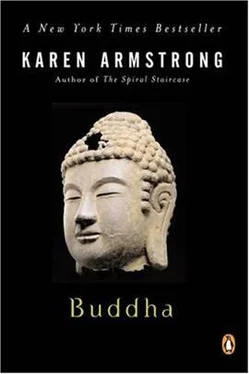But Gotama was ready to give this reading of the yogic experience one last try. The plane of “nothingness” was not the highest dyatana. There was a fourth plane, called “neither-perception-nor-nonperception.” It could be that this highly refined state did lead to the Self. He heard that another yogin called Uddaka Ramaputta had achieved the rare distinction of reaching this exalted dyatana, so he went to join his sangha in the hope that Uddaka could guide him to this peak yogic trance. Yet again, he was successful, but when he came back to himself, Gotama still found that he was prey to desire, fear and suffering. He could not accept Uddaka’s explanation that when he had entered this final yogic plane he had experienced the Self. Was what these mystics called the eternal Self perhaps simply another delusion? All that this type of yoga could do was give practitioners a brief respite from suffering. The metaphysical doctrine of Samkhya-Yoga had failed him, since it could not bring even a gifted yogin any final release.
So Gotama abandoned yoga for a time and turned to asceticism ( tapas ) , which some of the forest-monks believed could burn up all negative kamma and lead to liberation. He joined forces with five other ascetics and they practiced their exacting penances together, though sometimes Gotama sought seclusion, running frantically through the groves and thickets if he so much as glimpsed a shepherd on the horizon. During this period, Gotama went either naked or clad in the roughest hemp. He slept out in the open during the freezing winter nights, lay on a mattress of spikes and even fed on his own urine and feces. He held his breath for so long that his head seemed to split and there was a fearful roaring in his ears. He stopped eating and his bones stuck out “like a row of spindles… or the beams of an old shed.” When he touched his stomach, he could almost feel his spine. His hair fell out and his skin became black and withered. At one point, some passing gods saw him lying by the roadside, showing so few signs of life that they thought he had died. But all this was in vain. However severe his austerities, perhaps even because of them, his body still clamored for attention, and he was still plagued by lust and craving. In fact, he seemed more conscious of himself than ever.
Finally, Gotama had to face the fact that asceticism had proved as fruitless as yoga. All he had achieved after this heroic assault upon his egotism was a prominent rib cage and a dangerously weakened body. He might easily have died and still not attained the peace of Nibbana. He and his five companions were living near Uruvela at this time, on the banks of the broad Neranjara river. He was aware that the other five bhikkhus looked up to him as their leader, and were certain that he would be the first to achieve the final release from sorrow and rebirth. Yet he had failed them. Nobody, he told himself, could have subjected himself to more grueling penances, but instead of extricating himself from his human limitations, he had simply manufactured more suffering for himself. He had come to the end of the road. He had tried, to the best of his considerable abilities, the accepted ways to achieve enlightenment, but none of them had worked. The dhammas taught by the great teachers of the day seemed fundamentally flawed; many of their practitioners looked as sick, miserable and haggard as himself. Some people would have despaired, given up the quest, and returned to the comfortable life they had left behind. A householder might be doomed to rebirth, but so, it seemed, were the ascetics who had “Gone Forth” from society.
The yogins, ascetics and forest-monks had all realized that the self-conscious and eternally greedy ego was at the root of the problem. Men and women seemed chronically preoccupied with themselves, and this made it impossible for them to enter the realm of sacred peace. In various ways, they had tried to vanquish this egotism and get below the restless flux of conscious states and unconscious vasanas to an absolute principle, which, they believed, they would find in the depths of the psyche. Yogins and ascetics in particular had tried to retreat from the profane world, so that they became impervious to external conditions and sometimes seemed scarcely alive. They understood how dangerous egotism could be and tried to mitigate it with the ideal of ahimsa, but it seemed to be almost impossible to extinguish this selfishness. None of these methods had worked for Gotama; they had left his secular self unchanged; he was still plagued by desire and still immersed in the toils of consciousness. He had begun to wonder if the sacred Self was a delusion. He was, perhaps, beginning to think that it was not a helpful symbol of the eternal, unconditioned Reality he sought. To seek an enhanced Self might even endorse the egotism that he needed to abolish. Nevertheless Gotama had not lost hope. He was still certain that it was possible for human beings to reach the final liberation of enlightenment. Henceforth, he would rely solely on his own insights. The established forms of spirituality had failed him, so he decided to strike out on his own and to accept the dhamma of no other teacher. “Surely,” he cried, “there must be another way to achieve enlightenment!”
And at that very moment, when he seemed to have come to a dead end, the beginning of a new solution declared itself to him.
Chapter 3 – Enlightenment
the legends indicate that Gotama’s childhood had been spent in an unawakened state, locked away from that knowledge of suffering which alone can bring us to spiritual maturity, but in later years he recalled that there had been one moment which had given him intimations of another mode of being. His father had taken him to watch the ceremonial ploughing of the fields before the planting of the next year’s crop. All the men of the villages and townships took part in this annual event, so Suddhodana had left his small son in the care of his nurses under the shade of a rose-apple tree while he went to work. But the nurses decided to go and watch the ploughing, and, finding himself alone, Gotama sat up. In one version of this story, we are told that when he looked at the field that was being ploughed, he noticed that the young grass had been torn up and that insects and the eggs they had laid in these new shoots had been destroyed. The little boy gazed at the carnage and felt a strange sorrow, as though it were his own relatives that had been killed. But it was a beautiful day, and a feeling of pure joy rose up unbidden in his heart. We have all experienced such moments, which come upon us unexpectedly and without any striving on our part. Indeed, as soon as we start to reflect upon our happiness, ask why we are so joyful and become self-conscious, the experience fades. When we bring self into it, this unpremeditated joy cannot last: it is essentially a moment of ecstasy, a rapture which takes us outside the body and beyond the prism of our own egotism. Such exstasis, a word that literally means “to stand outside the self,” has nothing to do with the craving and greed that characterize so much of our waking lives. As Gotama reflected later, it “existed apart from objects that awaken tanha. ” The child had been taken out of himself by a moment of spontaneous compassion, when he had allowed the pain of creatures that had nothing to do with him personally to pierce him to the heart. This surge of selfless empathy had brought him a moment of spiritual release.
Instinctively, the boy composed himself and sat in the asana position, with straight back and crossed legs. A natural yogin, he entered into the first jhana, a trance in which the meditator feels a calm happiness but is still able to think and reflect. Nobody had taught him the techniques of yoga, but for a few moments, the child had a taste of what it might be like to leave himself behind. The commentary tells us that the natural world recognized the spiritual potential of the young Gotama. As the day wore on, the shadows of the other trees moved, but not the shade of the rose-apple tree, which continued to shield the boy from the blazing sun. When the nurses came back, they were stunned by the miracle and fetched Suddhodana, who paid homage to the little boy. These last elements are certainly fictional, but the story of the trance, historical or not, is important in the Pali legend and is said to have played a crucial role in Gotama’s enlightenment.
Читать дальше












